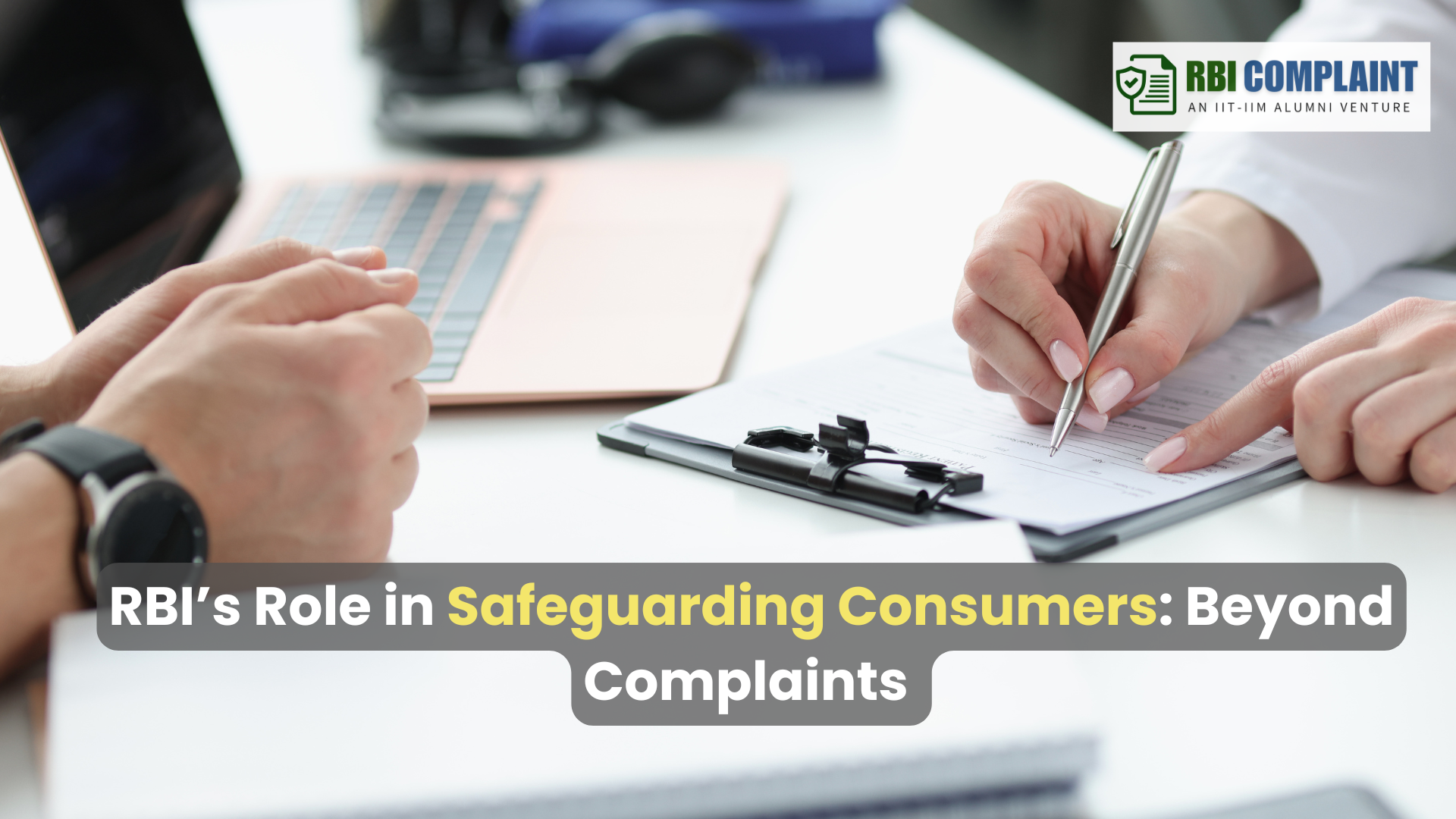· RBI Consumer Protection · 5 min read
RBI’s Role in Safeguarding Consumers: Beyond Complaints
Discover how the RBI safeguards consumers beyond just handling complaints. Learn about regulations, consumer education, and protective measures.

When discussing India’s banking sector, the Reserve Bank of India (RBI) stands as the central force ensuring both economic stability and robust consumer protection. Navigating the complex banking landscape can feel daunting, making the RBI’s role indispensable for consumer trust. Understanding the RBI’s work in consumer protection, beyond simply handling complaints, is essential for recognizing its impact on our everyday financial security.
Understanding the RBI’s Mandate
The RBI was established in 1935 to stabilize the economy, but its mission has evolved over the decades. Today, its objectives extend far beyond monetary policy. It now emphasizes consumer rights in banking, working to protect consumers from unfair practices and provide a safe financial environment.
Consumer Protection: A Key Focus
Consumer protection in banking means ensuring fair treatment, transparency, and security for all customers. When entering a bank or conducting transactions, customers should feel empowered by knowing safeguards are in place. This is the core of the RBI’s consumer protection mission.
Mechanisms for Consumer Protection
Establishment of the Banking Ombudsman Scheme
One of the RBI’s significant initiatives is the Banking Ombudsman Scheme, a mediation mechanism that allows consumers to resolve complaints without resorting to lengthy legal processes. It serves as an impartial mediator, ensuring banks abide by fair practices and giving consumers an efficient route to resolve grievances.
Role of Customer Service in Banks
While banks are expected to maintain effective customer service, the Banking Ombudsman serves as a backup when customer service fails. This structured approach to complaints fosters confidence among consumers that their issues will be addressed fairly.
Regulatory Framework
Key Regulations Aimed at Protecting Consumers
The RBI has established a range of regulations to safeguard consumer rights. For example, credit card regulations prevent unfair penalties and hidden fees. These rules act as a shield, ensuring that consumers are protected from exploitative practices.
RBI Guidelines for Fair Practices in Banking
The RBI mandates transparency in all banking activities, requiring banks to disclose terms, interest rates, and fees clearly. Transparency builds trust, allowing consumers to make informed choices without fear of hidden conditions or misrepresentations.
Consumer Education and Awareness
RBI’s Initiatives in Financial Literacy
Financial literacy is a powerful tool for consumer protection. The RBI hosts workshops, publishes resources, and runs campaigns to educate the public about financial products and their rights, empowering consumers to make informed decisions.
Importance of Educating Consumers About Their Rights
Knowing one’s rights is critical in the banking world. The RBI’s educational efforts focus on making consumers aware of their entitlements, from fair treatment to access to information and protection from retaliation when lodging complaints.
Handling Complaints: More Than Just a Process
Overview of the Complaints Resolution Mechanism
The RBI provides a structured complaints process for unresolved grievances. Through the Banking Ombudsman, consumers have a clear pathway to escalate issues, ensuring their voices are heard and acted upon.
Case Studies Highlighting Successful Resolutions
Stories of successful complaint resolutions underscore the RBI’s effectiveness. For instance, a consumer who was mistakenly charged a fee was reimbursed in full after filing a complaint with the Ombudsman. Such cases not only demonstrate the system’s success but also encourage others to stand up for their rights.
Promoting Transparency in Banking
Importance of Transparency for Consumer Trust
Transparency is essential in fostering trust. When banks communicate openly, consumers feel empowered. The RBI emphasizes this, requiring clear communication of terms and conditions to build a trustworthy financial environment.
RBI’s Efforts in Ensuring Clear Communication
The RBI mandates that banks use simple language and provide accessible explanations of products and services. This effort helps consumers make informed choices and feel secure in their financial transactions.
The Role of Technology in Consumer Protection
Digital Banking and Its Implications for Consumers
As banking goes digital, new risks arise. The RBI recognizes these challenges and works to secure digital transactions, implementing guidelines to protect consumers in an increasingly digital world.
RBI’s Initiatives to Enhance Cybersecurity
The RBI has issued cybersecurity guidelines to protect consumers from online threats. By prioritizing security protocols, the RBI aims to shield consumers from cyber risks while enjoying the convenience of digital banking.
Consumer Advocacy: RBI’s Collaborative Efforts
Partnerships with Consumer Organizations
Collaboration is vital to understanding and addressing consumer concerns. The RBI partners with consumer groups, promoting a balanced approach to policy-making and ensuring consumer interests remain at the forefront.
Engaging with Stakeholders for Better Policies
The RBI actively involves stakeholders—banks, advocacy groups, and consumers—in shaping policies. This inclusive process ensures consumer protection measures stay relevant and effective in addressing evolving challenges.
The Future of Consumer Protection in Banking
Emerging Challenges in Consumer Protection
As digital banking grows and financial products become more complex, consumer protection faces new challenges. The RBI remains vigilant, adapting its policies to ensure consumers are safeguarded in this dynamic environment.
RBI’s Vision for the Future
The RBI is committed to continuous improvement in consumer protection. Its vision for the future includes not only adapting to emerging trends but also strengthening existing policies to ensure the highest standards of consumer safety.
Conclusion
The RBI’s role in safeguarding consumers extends far beyond handling complaints. Through rigorous regulations, consumer education, and a commitment to transparency, the RBI empowers individuals and strengthens trust in the banking sector. Next time you engage with your bank, remember that you’re not just a customer—you have rights, and the RBI is there to protect them.



.T75TIjnH.jpg)